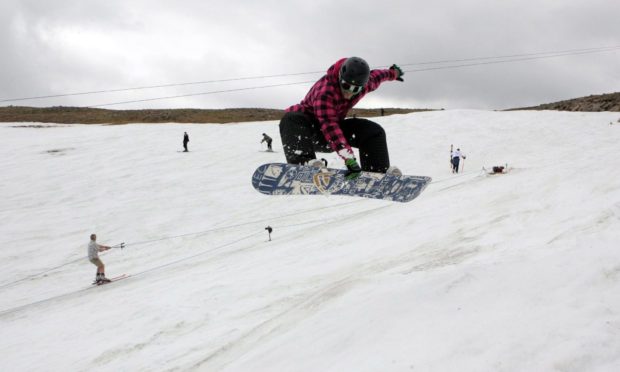Ski industry leaders have warned seasonal workers at Scotland’s mountain resorts will be laid off unless they get access to the UK Government’s furlough scheme.
The warning was delivered by Snowsport Scotland as Chancellor Rishi Sunak was urged by the Scottish Government to make furlough more flexible so ski patrollers, instructors and other workers are not excluded.
Scotland’s Economy Secretary, Fiona Hyslop, has written to Mr Sunak to highlight the plight of those who work at the Cairngorms, Lecht, Glenshee, Glencoe and Nevis Range ski areas during the winter.
Ms Hyslop’s letter welcomed the Treasury’s decision to extend the scheme, which enables employers to pay staff 80% of their usual wages up to £2,500 per month, until the end of April.
The blow we have got in terms of ski centres closing in Scotland is, we are forced to make those ski workers redundant rather than furloughing them because we don’t have that option available to us.”
Trafford Wilson, chief executive of Snowsport Scotland
But the Economy Secretary pointed out that the cut-off date for people to get furlough support was October 30 last year, a deadline that was too early for some of the resorts’ seasonal staff who tend not to start work until the December snowfalls.
Ms Hyslop argued the cut-off date risked reducing effectiveness of the support package, pointing out that around 2% of the workforce start a new job each month with approximately 670,000 people beginning a new role in November.
“Additionally, there are some sectors, such as ski resorts, where seasonal work means that staff would not have been on the payroll before October 30 but would normally expect to be working over the winter,” Ms Hyslop wrote.
“It is essential that the right support is provided to encourage people to start new jobs, and employers to take on new staff.
“We need the scheme to be flexible and not impact disproportionately on new workers or unintentionally undermine labour market churn, as was evident during the March 2020 lockdown.”
High proportion of seasonal workers
Trafford Wilson, Snowsport Scotland chief executive, estimated more than 200 people were employed in resorts on a seasonal basis.
“The very nature of our industry is that centres are not in position to take on huge teams throughout the year because the majority of the money is made during the winter,” Mr Wilson said.
“They do bring in a high proportion of seasonal workers. The blow we have got in terms of ski centres closing in Scotland is, we are forced to make those ski workers redundant rather than furloughing them because we don’t have that option available to us.”
Bumper season
The Covid-restrictions resulted in ski-lifts ceasing to operate this week, a source of frustration at a time when snow conditions are relatively good.
“The last two seasons have been poor because of the poor snow conditions,” Mr Wilson said. “Now we have got the snow conditions, but we can’t use it. We were hoping this was going to be a bumper season.
“The ski industry makes a significant contribution to the Scottish economy, local jobs and tourism. Additionally, we have got 750,000 visitors into ski seasons every single year. We need the ski centres to continue operating for all that positive stuff to happen.”
Cairngorm Mountain (Scotland) Ltd has 40 permanent staff, of whom 27 are furloughed. Of its 18 seasonal workers, nine were on the payroll before the cut-off date and are receiving furlough. Nine, however, have missed out because they were not on the company’s books by October 30.
If seasonal workers could receive a similar benefit during the present lockdown, that would be very welcome across the ski sector.”
Susan Smith
Susan Smith, interim chief executive at the resort near Aviemore, said: “Seasonal workers play a vital role in Scotland’s mountain resorts and are a committed part of our workforce here at Cairngorm.
“When the furlough scheme was introduced last March, we were able to ensure it applied to seasonal posts as well as permanent ones, and we know that meant a great deal to our staff and their families.”
She added: “If seasonal workers could receive a similar benefit during the present lockdown, that would be very welcome across the ski sector.”
The Treasury said £9.9 billion had come to Scotland in extra money during the coronavirus crisis and more than 930,000 Scottish jobs had been protected.
Scottish Secretary Alister Jack said: “As throughout this crisis, the UK Government’s priority remains to keep people safe and support jobs in all parts of the UK.
“The Chancellor has set out additional support for businesses in England. We hope the Scottish Government uses some of the £8.6 billion we have provided to support struggling Scottish businesses similarly.
“This is on top of the direct UK Government support for people and businesses in Scotland – including our furlough scheme now extended to the end of April, self-employed support, business loans and procuring and paying for millions of doses of the Pfizer and Oxford vaccines.”
Mr Jack added: “The strength of the Union and support offered by the UK Treasury has never been more important.”


